David Eveleigh-Evans, Method CCO and Josh Newnham, Lead Technologist — Method London, spoke with Mark Wilson of FastCoDesign about Nightingale, a pill reminder system that is neither something you have to wear, nor that will buzz in your pocket all day.
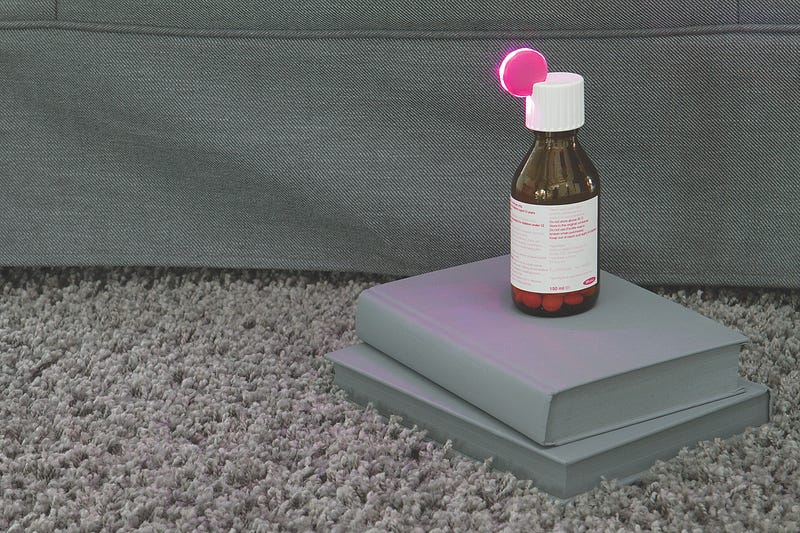
Even in clinical trials testing new drugs, patients can forget to take their doses half the time. It’s an especially frightening thought for seniors, who might be juggling a dozen different prescriptions for multiple chronic conditions — but who reasonably don’t want to be nagged about taking their pills all day long.
A new concept from the London arm of the design consultancy Method imagines a pill reminder system that’s neither something obtrusive that you have to wear, nor something that will buzz in your pocket all day. The concept, called Nightingale, reminds you to take medications by making objects in your environment glow — from teapots to wall clocks. But crucially, rather than bugging you to take your pills, it’s designed to teach you to take your pills. “It’s not a policing system; it’s more of a coaching system,” says David Eveleigh-Evans, chief creative officer of Method.
“The idea was almost to provide external triggers to help the user develop a good habit,” continues Josh Newnham, lead technologist at Method. “Obviously, as the habit gets formed, you can start quieting down all the external triggers.”
Research has found that mapping a new behavior to an existing ritual can help it become routine. Playing off that idea, Nightingale embeds glowing reminders around your home in Internet-connected objects, with an LED glow that might appear as you make your morning drink, or watch TV in the evening, to respond to your life’s regular schedule.
“People naturally go and make tea, or clean and wash in the bathroom,” says Eveleigh-Evans. “The home denotes the context, the objects reinforce the pattern.”
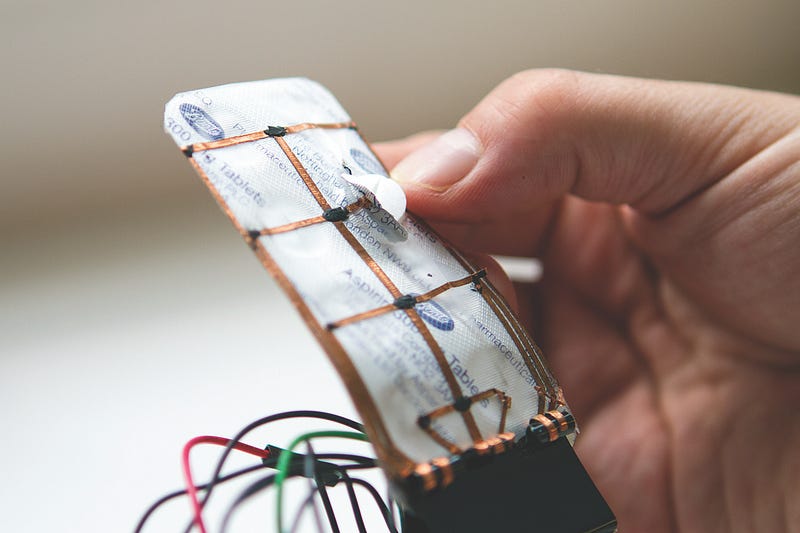
As you start a new medication, these reminders might glow with each dose. But thanks to Bluetooth-connected bottles, and even smart clips to hold those clever pre-proportioned pill packs, to track and monitor your pill consumption, Nightingale knows if you’re taking medications properly, and when you are, it can gradually tone down environmental reminders to disappear (unless you forget to take your medicine — at which point, objects around your home will gradually light up to get your attention).
“One of the problems with notifications on your phone is they can become annoying,” says Newnham. “The idea here was to recognize that the user has taken medication, and to mute any other notifications that might be pushed [reminding them superfluously].”
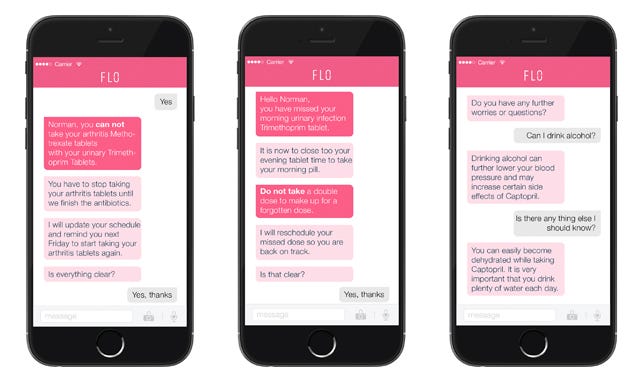
Yet reminders are only one half of Nightingale. The other half is an app called Flo. Rather than a hub for reminders, it’s a conversational interface that would allow patients to text questions (“Can I take this new medication with food?”) to an artificial intelligence bot. Much as a nurse might take into account whether she’s talking to a child or an adult, Flo would be algorithmically personalized to respond with a tone and clarity matching each user over time. We imagine that means Flo might talk to a worried 10-year-old with soothing words, and a 30-year-old who is always running late with curt and clear remarks. An overzealous idea? Maybe. But in reality, Flo isn’t much different from the Facebook Messenger bots, or the capabilities of Google’s auto-responding AI systems, we’re seeing today. They’re both systems capable of generating text message responses to match whatever conversation you’re in.
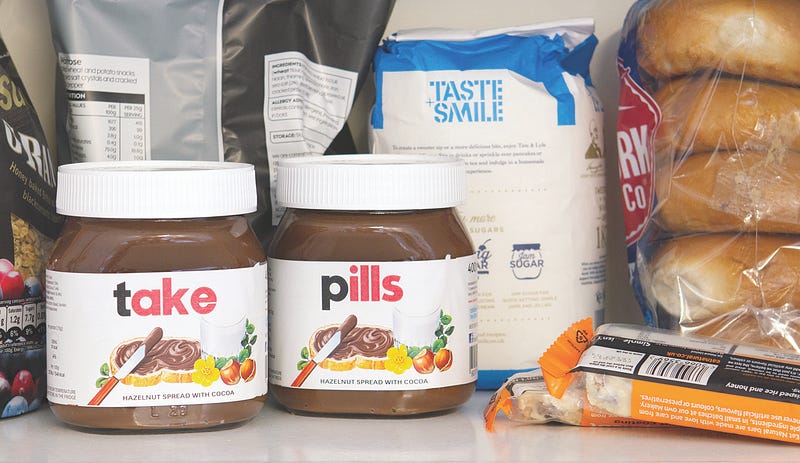
Even in clinical trials testing new drugs, patients can forget to take their doses half the time. It’s an especially frightening thought for seniors, who might be juggling a dozen different prescriptions for multiple chronic conditions — but who reasonably don’t want to be nagged about taking their pills all day long.
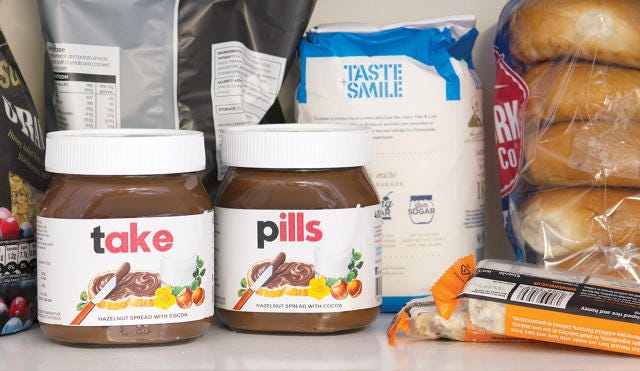
A new concept from the London arm of the design consultancy Method imagines a pill reminder system that’s neither something obtrusive that you have to wear, nor something that will buzz in your pocket all day. The concept, called Nightingale, reminds you to take medications by making objects in your environment glow — from teapots to wall clocks. But crucially, rather than bugging you to take your pills, it’s designed to teach you to take your pills. “It’s not a policing system; it’s more of a coaching system,” says David Eveleigh-Evans, chief creative officer of Method.
“The idea was almost to provide external triggers to help the user develop a good habit,” continues Josh Newnham, lead technologist at Method. “Obviously, as the habit gets formed, you can start quieting down all the external triggers.”
Research has found that mapping a new behavior to an existing ritual can help it become routine. Playing off that idea, Nightingale embeds glowing reminders around your home in Internet-connected objects, with an LED glow that might appear as you make your morning drink, or watch TV in the evening, to respond to your life’s regular schedule.
“People naturally go and make tea, or clean and wash in the bathroom,” says Eveleigh-Evans. “The home denotes the context, the objects reinforce the pattern.”
It’s not a policing system; it’s more of a coaching system.
As you start a new medication, these reminders might glow with each dose. But thanks to Bluetooth-connected bottles, and even smart clips to hold those clever pre-proportioned pill packs, to track and monitor your pill consumption, Nightingale knows if you’re taking medications properly, and when you are, it can gradually tone down environmental reminders to disappear (unless you forget to take your medicine — at which point, objects around your home will gradually light up to get your attention).
“One of the problems with notifications on your phone is they can become annoying,” says Newnham. “The idea here was to recognize that the user has taken medication, and to mute any other notifications that might be pushed [reminding them superfluously].”
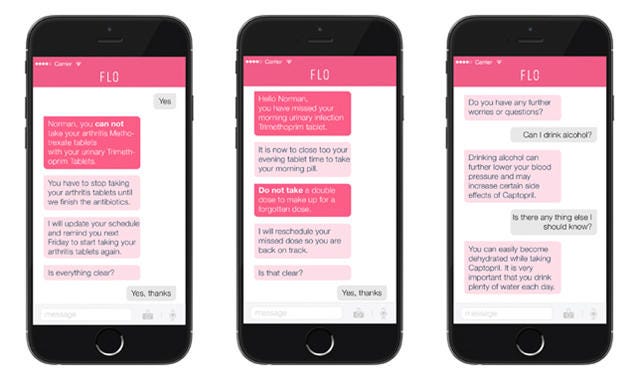
Yet reminders are only one half of Nightingale. The other half is an app called Flo. Rather than a hub for reminders, it’s a conversational interface that would allow patients to text questions (“Can I take this new medication with food?”) to an artificial intelligence bot. Much as a nurse might take into account whether she’s talking to a child or an adult, Flo would be algorithmically personalized to respond with a tone and clarity matching each user over time. We imagine that means Flo might talk to a worried 10-year-old with soothing words, and a 30-year-old who is always running late with curt and clear remarks. An overzealous idea? Maybe. But in reality, Flo isn’t much different from the Facebook Messenger bots, or the capabilities of Google’s auto-responding AI systems, we’re seeing today. They’re both systems capable of generating text message responses to match whatever conversation you’re in.

As cold or as inhuman as all of these automatic, robot-backed systems may seem in theory, they’re likely a necessity as we have a senior population that’s outpacing the growth of our health care infrastructure. Which is why Method built Nightingale, not just to be a practical system around medication adherence, but to engender some level of empathy within the experience.
“The question we centered ourselves around was, ‘What does it mean if data is human — if you have to control somebody, or create an outcome, from an interaction perspective?’” says Eveleigh-Evans. “We want to have a more holistic view…where does one push and one pull?”
Originally published on FastCoDesign on August 4th, 2016.